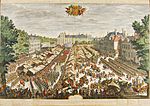Aqsa Mosque, The Hague

The Aqsa Mosque (Dutch: Aksamoskee) is a mosque in the Dutch city of The Hague. It was originally built as a synagogue. The neoclassical building on the Wagenstraat opened in 1844, serving the Ashkenazi Jews of the city. It was expanded in 1922 and damaged by fire in 1944. Around 80% of the city's Jews were killed in the Holocaust, while their synagogues were plundered.In 1976, the Jewish community sold the building to the city on condition that it never be converted into a church. The city's Turkish Muslim community began using it without permission during Ramadan 1979 due to safety concerns over their previous mosque. The Turkish community took legal ownership of the building in 1981. The Jewish community moved into a converted former Protestant church, which has since been mostly repurposed as apartments.The building is a Rijksmonument with the number 459778, inscribed 19 October 1993.
Excerpt from the Wikipedia article Aqsa Mosque, The Hague (License: CC BY-SA 3.0, Authors, Images).Aqsa Mosque, The Hague
Nieuwe Molstraat, The Hague Centrum
Geographical coordinates (GPS) Address External links Nearby Places Show on map
Geographical coordinates (GPS)
| Latitude | Longitude |
|---|---|
| N 52.07496 ° | E 4.31325 ° |
Address
HDV Mescid-I Aksa Camii (Mescidi Aksa Moskee)
Nieuwe Molstraat
2512 BH The Hague, Centrum
South Holland, Netherlands
Open on Google Maps









